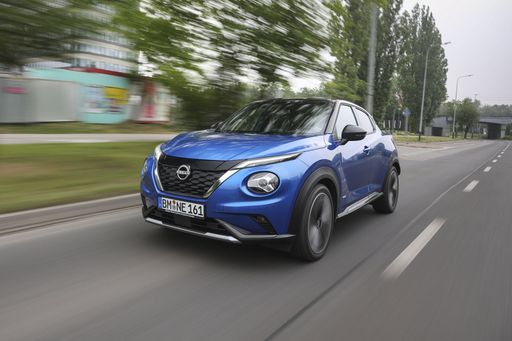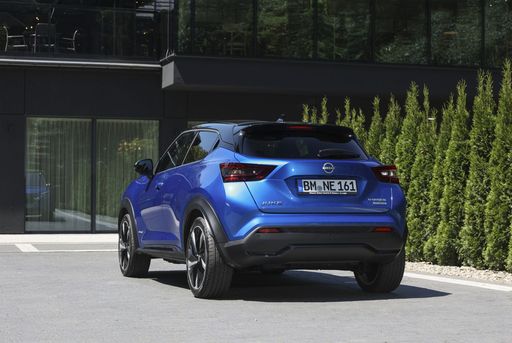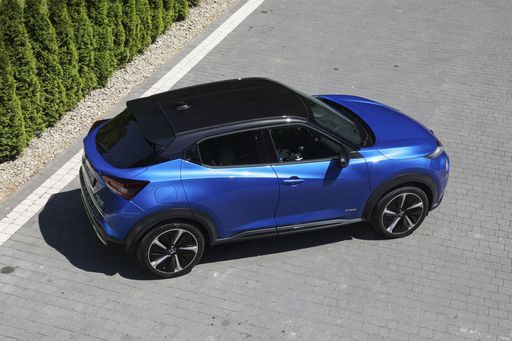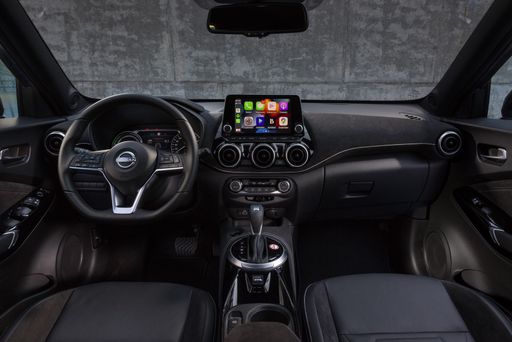Hyundai Kona VS Nissan Juke
Hyundai Kona
The Hyundai Kona blends a bold design with a versatile interior, making it a standout choice in the compact SUV market. Its crisp handling and responsive steering provide an engaging driving experience, whether in the city or on the open road. The vehicle also offers a range of features designed to enhance comfort and connectivity, ensuring a pleasurable journey for both driver and passengers.
detailsNissan Juke
The Nissan Juke stands out with its distinctive design and bold styling, making it a popular choice for those seeking something different on the road. Its interior cleverly combines modern technology with comfort, offering an enjoyable driving experience for both the driver and passengers. Despite its compact size, the Juke provides a surprising amount of space and versatility, making it suitable for urban adventures and weekend getaways alike.
details @ hyundai.news
@ hyundai.news
 @ hyundai.news
@ hyundai.news
 @ hyundai.news
@ hyundai.news
 @ hyundai.news
@ hyundai.news
 @ germany.nissannews.com
@ germany.nissannews.com
 @ germany.nissannews.com
@ germany.nissannews.com
 @ germany.nissannews.com
@ germany.nissannews.com
 @ germany.nissannews.com
@ germany.nissannews.com

|

|
|
|
|
Costs and Consumption |
|
|---|---|
|
Price
about 22600 - 41600
£
|
Price
about 21200 - 29900
£
|
|
Consumption L/100km
4.5 - 6.7
L
|
Consumption L/100km
4.7 - 6
L
|
|
Consumption kWh/100km
14.6 - 16.8
kWh
|
Consumption kWh/100km
-
|
|
Electric Range
377 - 514
km
|
Electric Range
-
|
|
Battery Capacity
1.3 - 65.4
kWh
|
Battery Capacity
0.6
kWh
|
|
co2
128, 103, 141, 152, 0
g/km
|
co2
107 - 137
g/km
|
|
Fuel tank capacity
38 - 47
L
|
Fuel tank capacity
46
L
|
Dimensions and Body |
|
|
Body Type
SUV
|
Body Type
SUV
|
|
Seats
5
|
Seats
5
|
|
Doors
5
|
Doors
5
|
|
Curb weight
1370 - 1773
kg
|
Curb weight
1274 - 1405
kg
|
|
Trunk capacity
466
L
|
Trunk capacity
354 - 422
L
|
|
Length
4350 - 4385
mm
|
Length
4210
mm
|
|
Width
1825
mm
|
Width
1800
mm
|
|
Height
1580 - 1585
mm
|
Height
1593
mm
|
|
Payload
420 - 490
kg
|
Payload
405 - 427
kg
|
Engine and Performance |
|
|
Engine Type
Petrol, Full Hybrid, Electric
|
Engine Type
Petrol, Full Hybrid
|
|
Transmission
Manuel, Automatic
|
Transmission
Manuel, Automatic
|
|
Transmission Detail
Manual Gearbox, Automat. Schaltgetriebe (Doppelkupplung), Reduction Gearbox
|
Transmission Detail
Manual Gearbox, Automat. Schaltgetriebe (Doppelkupplung), Automatic Gearbox
|
|
Drive Type
Front-Wheel Drive, All-Wheel Drive
|
Drive Type
Front-Wheel Drive
|
|
Power HP
100 - 218
HP
|
Power HP
114 - 143
HP
|
|
Acceleration 0-100km/h
7.8 - 13.3
s
|
Acceleration 0-100km/h
10.1 - 11.8
s
|
|
Max Speed
162 - 208
km/h
|
Max Speed
166 - 180
km/h
|
|
Torque
200 - 265
Nm
|
Torque
200
Nm
|
|
Number of Cylinders
3 - 4
|
Number of Cylinders
3 - 4
|
|
Power kW
74 - 160
kW
|
Power kW
84 - 105
kW
|
|
Engine capacity
998 - 1598
cm3
|
Engine capacity
999 - 1598
cm3
|
|
Top speed
162 - 208
km/h
|
Top speed
166 - 180
km/h
|
General |
|
|
Model Year
2024
|
Model Year
2024
|
|
CO2 Efficiency Class
D, C, E, A
|
CO2 Efficiency Class
D, E, C
|
|
Brand
Hyundai
|
Brand
Nissan
|
Hyundai Kona
The Hyundai Kona: A Comprehensive Overview
The Hyundai Kona has established itself as a standout in the compact SUV segment, blending innovation with performance and style. As the automotive world moves towards more sustainable and efficient options, the Kona offers a variety of powertrains, from traditional petrol engines to full hybrids and all-electric models.
Powertrain Options and Performance
The Hyundai Kona's powertrain choices cater to a wide range of preferences. For petrol enthusiasts, the Kona offers a 1.0L T-GDI engine, delivering 100 PS, and a more robust 1.6L T-GDI variant with up to 170 PS. Those looking for efficiency without sacrificing power can consider the full hybrid model, offering 129 PS and an impressive consumption of 4.5 L/100km.
For a greener option, the all-electric Kona provides a compelling case. With battery capacities of up to 65.4 kWh, the electric Kona offers power outputs of 156 to 218 PS, and efficiencies as low as 14.6 kWh/100km, enabling an electric range of up to 513 km.
Technical Specifications and Innovations
Built on a robust platform, the Kona delivers versatility and reliability. With a choice between manual or dual-clutch automatic gearboxes, along with options for front-wheel or all-wheel drive, the Kona ensures a tailored driving experience. The handling is enhanced by the car's lightweight construction, balancing a 1370 to 1773 kg curb weight with dynamic performance.
The Kona's design doesn't compromise cargo space for style; it offers a generous 466 L boot capacity. With a relatively compact body, measuring 4350 to 4385 mm in length, the Kona easily navigates urban environments while still commanding a strong road presence with its 1825 mm width.
Efficiency and Eco-Friendliness
Hyundai is committed to reducing emissions, as evidenced by the Kona's CO2 efficiency ratings, which range from class A for electric models to class D for some higher-performance petrol variants. The focus on reducing environmental impact without sacrificing driving pleasure is notable throughout the Kona range.
Costing and Value
The Hyundai Kona offers commendable value for money. Pricing starts at €26,400 and reaches up to €50,690, depending on the chosen configuration. The monthly running costs range from €956 to €1090, with a cost per kilometre of 38.3 to 43.6 cents, making it a competitive option in its class.
Conclusion: Modern, Efficient, and Versatile
The Hyundai Kona stands as a testament to Hyundai's commitment to innovation, efficiency, and practicality. Whether you are inclined towards a traditional combustion engine, a hybrid for a balance of power and efficiency, or a full electric model for maximum eco-friendliness, the Kona provides a tailored solution for each unique driver preference.
Nissan Juke
Introduction to the Nissan Juke: A Compact SUV with Style
The Nissan Juke has always been a standout in the compact SUV segment, renowned for its bold design and impressive versatility. As we look at the 2024 model year, Nissan continues to innovate, offering a range of options that cater to both practicality and driving pleasure.
Performance and Efficiency: Under the Bonnet of the Nissan Juke
The 2024 Nissan Juke comes with a variety of engine choices tailored to suit different driving needs. With power outputs ranging from 114 to 143 PS, these engines strike a balance between performance and efficiency. The petrol options are equipped with a 1.0-litre three-cylinder engine that generates 114 PS, providing a sprightly drive perfect for urban environments. Meanwhile, the 1.6-litre hybrid version offers 143 PS, combining electric and petrol power for a more eco-friendly performance.
Fuel consumption varies between 4.7 and 6 L/100km, highlighting the Juke's commitment to efficiency. With CO2 emissions ranging from 107 to 137 g/km, the Nissan Juke offers an environmentally conscious choice for drivers seeking to reduce their carbon footprint.
Driving Technology and Innovation
Innovation is at the heart of the Nissan Juke, with cutting-edge technology designed to enhance the driving experience. The hybrid variants use a unique full-hybrid system, incorporating a small 0.6 kWh battery to provide seamless power assistance during acceleration. This system not only improves efficiency but also supports a smooth, responsive driving experience.
The Juke's manual gearboxes and various automatic transmission options, including the efficient dual-clutch transmission, ensure that drivers can choose the driving style that best suits their preferences. Front-wheel drive remains standard across the range, delivering dependable and predictable handling characteristics.
Design and Comfort: More Than Just Looks
The Juke's exterior is daringly distinctive, with a design that combines angular lines and a high-riding stance to create a sporty yet practical profile. The dimensions of 4,210 mm in length, 1,800 mm in width, and 1,593 mm in height, combined with its 5-door configuration, ensure ample space and accessibility for passengers and luggage alike.
Inside, the Nissan Juke accommodates up to five passengers with comfort and style. A boot capacity ranging from 354 to 422 litres provides adequate space for everyday life or weekend getaways. The various trim levels, including Acenta and Tekna, are equipped with premium features and technology to keep occupants entertained and comfortable.
Safety Features and Driver Assistance
Nissan has equipped the Juke with an array of safety features that provide peace of mind on the road. The Juke includes standard and optional technologies such as adaptive cruise control, lane-keeping assist, and emergency braking systems, enhancing both driver confidence and passenger safety.
With CO2 efficiency classes ranging from C to E, the Nissan Juke not only delivers advanced safety but also meets modern environmental standards.
Conclusion: A Balanced Compact SUV
The 2024 Nissan Juke stands out as a compelling choice in the compact SUV market. With its combination of eye-catching design, innovative technology, and efficient performance, the Juke continues to attract drivers looking for a unique vehicle that doesn’t compromise on practicality or driving pleasure. Whether in the city or on the open road, the Juke delivers a driving experience that is both thrilling and responsible.
